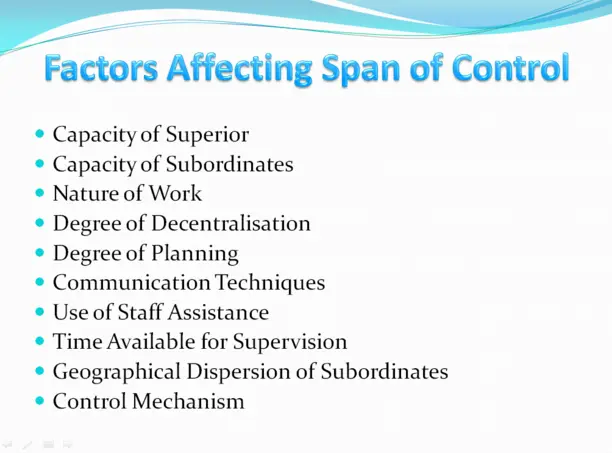Table of Contents:-
- Factors Affecting Span of Control
- Importance of Span of Control
Factors Affecting Span of Control
Factors Affecting Span of Control – The span of control is the range of direct, habitual communication contacts between the chief executive of a company and his principal fellow officers. This concept is related to the ‘Span of Attention principle.’
There are the following determinants of the span of control:
1) Capacity of Superior
Each manager has different abilities and capacities in respect of such factors as leadership, communication, decision making, control, etc., affecting the management of subordinates. Managers having more capacity concerning these factors can manage more subordinates in a similar situation.
2) Capacity of Subordinates
The capacity of subordinates also affects the degree of the span of management. Efficient and trained subordinates may discharge their functions more efficiently without much help from their superiors. They may just need broad guidelines and the rest of the things can be performed by them. In such cases, they require less time from their superior who will be in a position to manage a larger number of subordinates.
3) Nature of Work
The nature of work affects the degree of the span of management because different types of work require a different pattern of management and hence time from superiors. If subordinates are performing similar functions, they require less attention from their superiors and the span can be wider.
4) Degree of Decentralisation
The degree of centralisation or decentralisation affects the span of management by affecting the degree of involvement of the superior in decision making process. Thus higher the degree of decentralisation; the higher the degree of span.
5) Degree in Planning
Higher is the degree of plans, particularly standing plans providing rules, procedures, methods, etc., in doing the work; higher would be the degree of the span of management. In such cases, the subordinates can take action on their own.
6) Communication Techniques
The pattern of communication, its means, and media affect the time requirement in managing subordinates and consequently the span of management. If communication is mostly face-to-face, it requires more time on the part of both superiors and subordinates.
7) Use of Staff Assistance
The use of staff assistance in reducing the workload of managers enables them to manage more subordinates. Many of the managerial functions can be discharged by the staff members on behalf of the managers. They can collect information, process communication, and issue orders and instructions on behalf of their superior – this process saves time for managers and the degree of span can be increased.
8) Time Available for Supervision
A manager has to perform several responsibilities in addition to supervision. He has to perform the functions of planning, organising, coordinating and controlling. The span at a particular level depends upon the time available to a manager for supervision.
9) Geographical Dispersion of Subordinates
In an organization whose branches are located at different places, the employees naturally are dispersed at different places. To make the supervision effective from the headquarters it is better to have a narrow span of management.
10) Control Mechanism
The span of control is influenced by the control mechanism followed by the organisation. Control may be followed either by personal supervision or through reporting.
Related Articles:
- nature of marketing
- difference between questionnaire and schedule
- features of marginal costing
- placement in hrm
- limitations of marginal costing
- nature of leadership
- difference between advertising and personal selling

Importance of Span of Control
The problem of the span of control is a natural extension of the hierarchy or scalar system principle. As we know earlier, a hierarchical organisation involves several tiers or steps, one above the other, each step being headed by a single person. How many such levels an organisation should have depends upon the number of employees at the bottom to be supervised and the number of subordinates each superior officer can effectively supervise. This shows a close relationship between hierarchy and a wide span of control.
Hence, the levels or tiers in the hierarchy should be established after considering the span of control of a superior officer. If a superior officer is expected to control a large number of persons than he can control, the result is delay and inefficiency. The quality of the work of an organisation depends upon effective control and supervision. Hence, there is a strong need for the span of control principle. No organisation can ignore it. If the span exceeds an individual’s capacity, it results in the breakdown of the organisation.
You May Also Like:-
